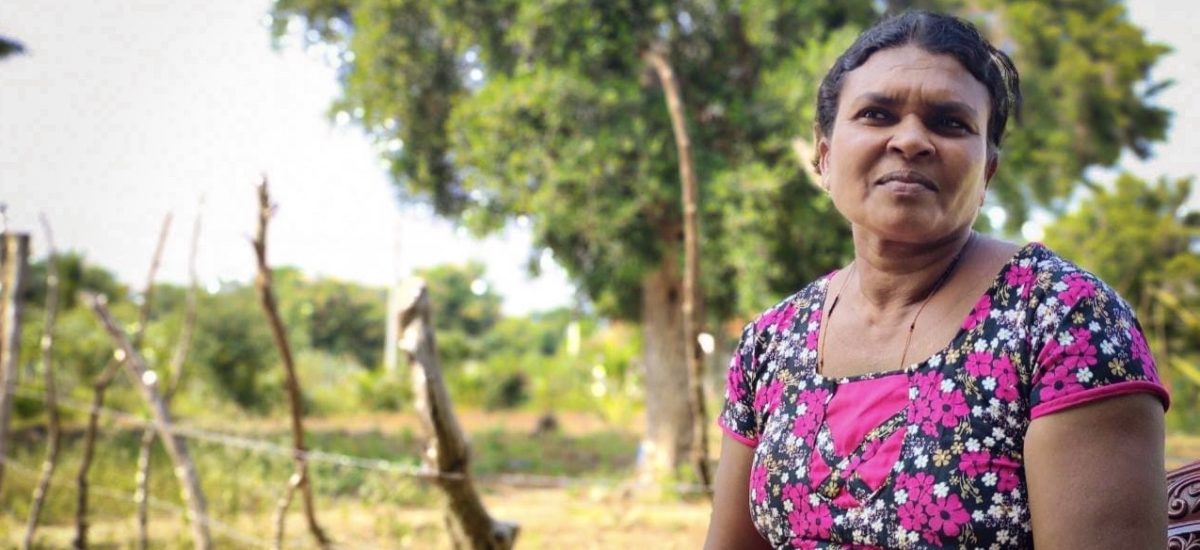Three years ago, the villagers of Mullikulam in the Mannar district left behind their brick homes with water, toilets and beds to camp out in tents on the land they called home. Their stand lasted three months during which time they had to withstand rampaging elephants and torrential rains; the tents flooded, forcing them to return.
One year earlier, they had launched a month-long protest outside the Navy occupied village demanding their land back and had been assured that it would happen very soon, but like so many before, it was an empty promise. After a year of waiting, they took matters into their own hands and decided to go back but it was an untenable situation to live without water, electricity or proper shelter.
The Navy officers in the area say they are willing to leave at any time since all necessary documents have been presented and the surveyor has completed his job but the order has to come from the Defence Ministry, which is deafeningly silent on the matter; whether this is deliberate or due to bureaucratic inefficiency is anyone’s guess.
The people of Mullikulam are Tamil Catholics who make a living by fishing and farming in nearby forests, tanks and the sea. Their village includes a 200 year-old church, a school, a hospital and a cooperative centre. Until the war tore their lives apart and drove them from their homes in 1990, the villagers were prosperous, with a steady income. Many of them returned after the 2002 Ceasefire Agreement and started to rebuild their homes and livelihoods.
In 2007, Mullikulam was taken over by the Army for what the villagers were told was a temporary situation. Some of them went to live with relatives while others were housed in makeshift huts elsewhere. Fourteen years later, most of them are still waiting to return because once the Army left, the Navy established its Northwestern Command Headquarters and Naval Institute at Mullikulam, occupying 27 houses that are used by its personnel. The villagers are now divided with some of them living on their original land and others resettled a few kilometres away.
The villagers want the 600 acres of ancestral land where they were born and raised to be released by the Navy so that they can go back to fishing and farming, reoccupy their homes, attend church and send their children to school. Now, although they live just a few kilometres away in comfortable houses provided by the government, they do not feel at home. They have been given just half an acre, hardly enough to divide among a few children. In Mullikulam many have five to 10 acres, with deeds and permits. Eight tanks on their properties have fallen into disrepair.
So far 77 acres have been given over by the Navy but some of the roads to the lands have been blocked. “We need an aircraft to reach them,” says one resident who prefers not to be named. “The people have accepted that the Navy can keep 269 acres but they want the other 600 acres back. No order is being given from Colombo even three years after the decision to hand back the land. Many people have been lobbying and appealing but to no avail.”
The villagers have been able to claim 22 acres on which 27 houses have been built for the returnees. However, if more land had been available the donors, Caritas Germany, would have provided 23 more houses.
Barrels and barbed wire separate the Navy and villagers from each other but they still live cheek by jowl in an uneasy peace. The villagers have to pass by the imposing grey stone structure of the Navy’s Northwestern Command Headquarters to get to their homes. The Navy road is smooth and evenly graveled. The sandy road leading to the church, the small school and the few scattered houses is full of pot holes. If the Navy personnel at the gate do not speak Tamil and the people do not speak Sinhala, they are unable to explain that they are visiting the church for a wedding, funeral or baptism. After being kept waiting for 20 minutes while the sentry calls a higher authority, the auspicious time has passed.
The resettled villagers want the entrance of the Command Headquarters to be shifted to another location so that they do not have to come past it every time they go to their homes but the Navy is insisting that the Rs. 6 million it claims is necessary for the move comes from a source other than the Rs. 355 billion defence budget.
The villagers who are yet unable to occupy their own land live a hand to mouth existence, barely able to survive by a little fishing and farming. They have no money to send their children for further education or to tide them over during sickness or injury.
Sebastianamma Croos fled to India in 1990 to escape the war, where she lived in a refugee camp for 15 years. Born and bred in Mullikulam, Mrs. Croos, who is 49, has three children. Her daughter is married and her son is a fisherman while her youngest child is still in school. In 2007 she was evicted from Mullikulam and went to stay with relatives. In 2011 she was resettled in a nearby area on half an acre of land. She was part of the group that went back to Mullikulam in 2018, living in a tent in the rain and dodging wild elephants who were foraging for food. After three months she went back but fully expected to return to her ancestral land. She says that half an acre is not enough to divide between three children. “We have ten acres in Mullikulam that will give me the chance to fish and farm and earn a good living. In any case, I want to spend my old age and die on the land where I grew up,” she says.
The Navy is occupying Mary Jacintha Dias’s house in Mullikulam. She has four children, one of whom is still in school. “Many donors and NGOs have come to see us but no one has been able to get our land back for us. My children can occupy these houses but I want to go back home,” she says.
Watch excerpts from the interview with Sebastianamma Croos below:


